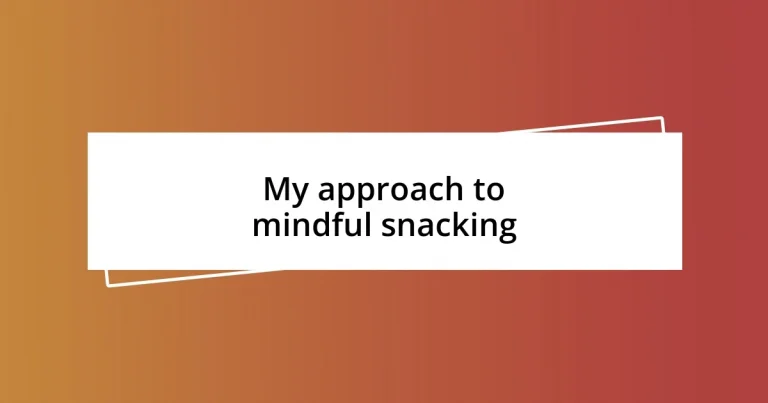Key takeaways:
- Mindful snacking enhances the eating experience by encouraging awareness of flavors, emotions, and hunger cues, transforming food into a source of joy rather than merely fuel.
- Benefits of mindful snacking include improved digestive health, increased satiety, and better emotional balance, contributing to a healthier relationship with food.
- Creating a mindful snacking plan involves thoughtful preparation and scheduling, helping to make healthier snack choices and preserving the enjoyment of eating.
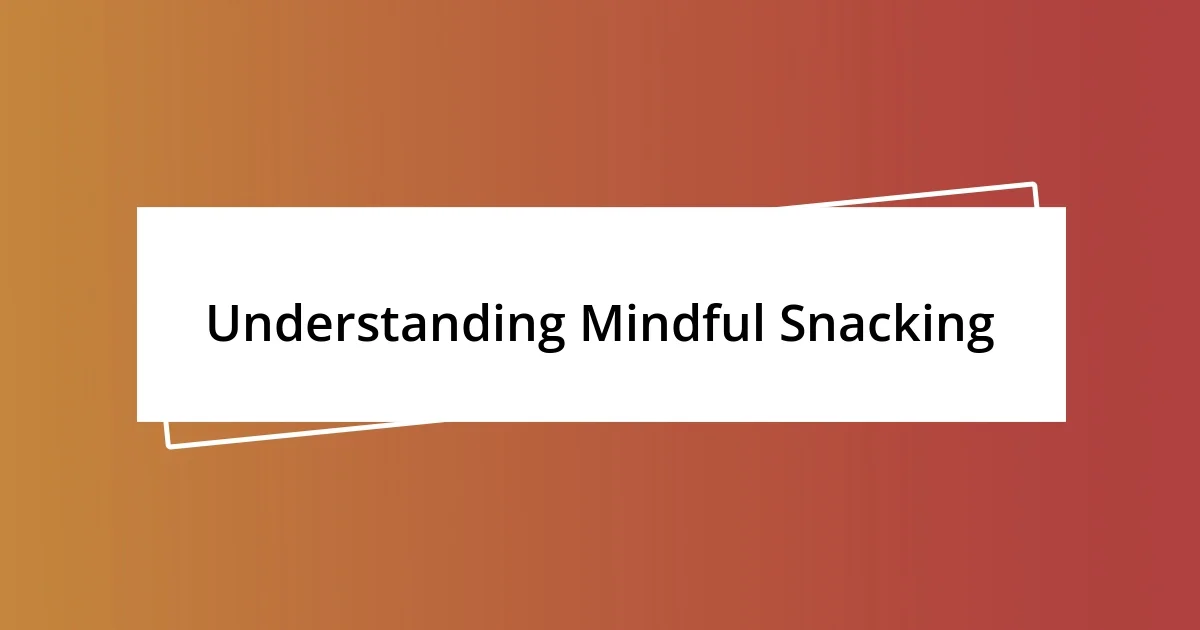
Understanding Mindful Snacking
Mindful snacking is all about tuning in to your body and the experience of eating. I remember a time when I mindlessly grabbed a handful of chips while watching TV. It wasn’t until the bowl was empty that I realized I hadn’t truly enjoyed a single chip. This experience taught me that mindful snacking encourages us to savor each bite, making our snacks not just fuel, but a delightful experience.
When we snack mindfully, we heighten our awareness of tastes, textures, and even the emotions tied to food. Have you ever noticed how certain snacks evoke specific memories? For instance, every time I nibble on dark chocolate, I’m transported back to cozy evenings spent with friends. Understanding this connection can deepen our relationship with food, turning each snack into a moment of joy rather than merely a routine.
At its core, mindful snacking prompts us to assess our hunger cues and choose foods that genuinely satisfy us. I’ve found that when I pause to consider my cravings, I often opt for a crunchy apple or a handful of nuts instead of something sugary. Isn’t it fascinating how just a moment of reflection can transform our choices into something healthier and more fulfilling?
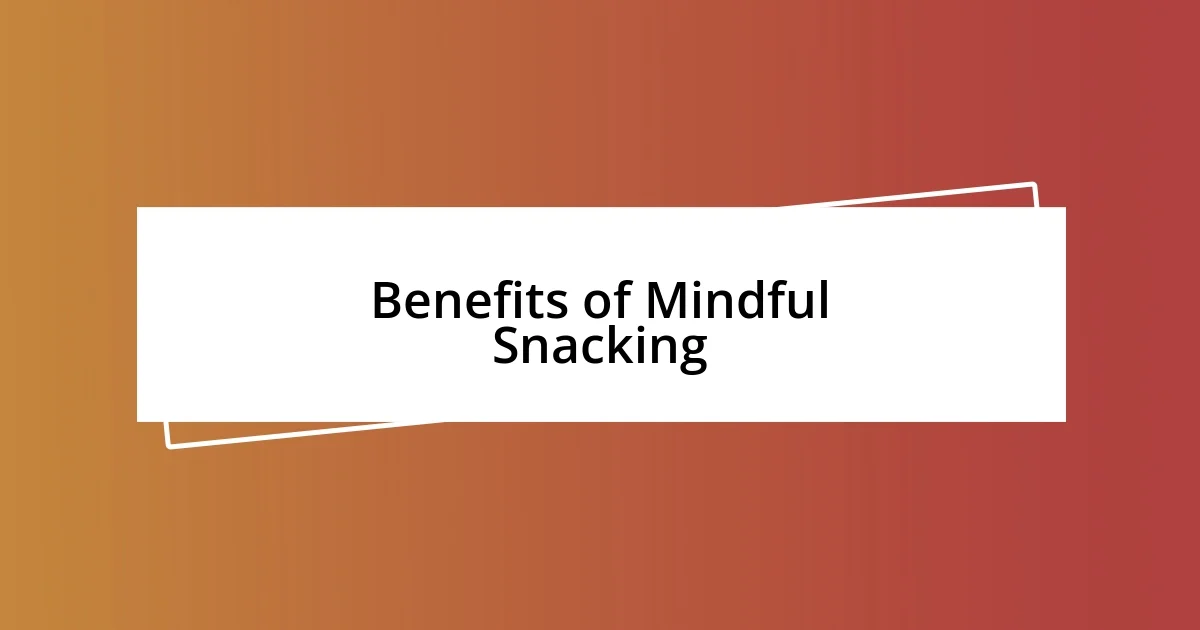
Benefits of Mindful Snacking
The benefits of mindful snacking extend far beyond simply choosing healthier options; it’s truly a holistic practice that can transform how we view food. I remember a day when I decided to take a snack break with a small bowl of yogurt topped with berries. Rather than diving in hastily, I took a moment to appreciate the colors and aroma. That simple act made me feel more satisfied, almost as if I had indulged in a decadent dessert instead of a healthy snack. Every bite felt rewarding, and I realized that mindful eating promotes not just enjoyment but also satisfaction that can last.
Here are some key benefits of mindful snacking:
- Enhanced Enjoyment: By savoring each bite, snacks become pleasurable experiences that we look forward to.
- Better Digestive Health: Eating slowly allows our bodies to digest food more effectively, leading to less discomfort.
- Increased Satiety: Mindfulness can help us recognize true hunger signals, preventing overeating.
- Improved Emotional Balance: Being aware of our emotional triggers related to snacking can help build a healthier relationship with food.
- Mindfulness Practice: Engaging in this practice cultivates a broader sense of mindfulness that can positively affect other areas of life.
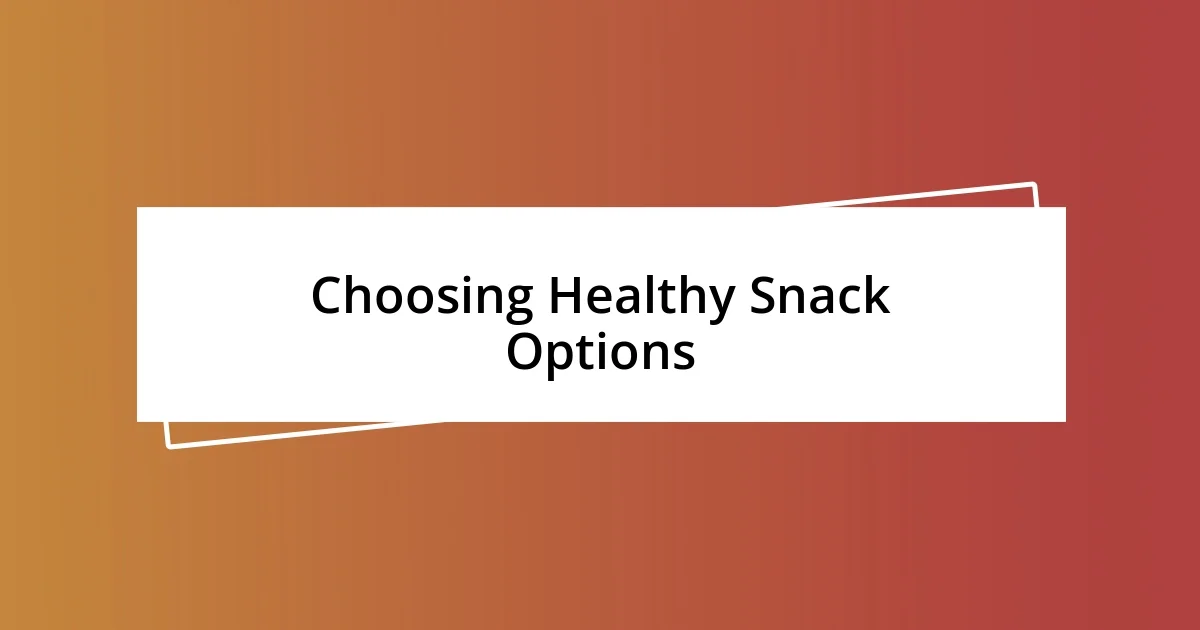
Choosing Healthy Snack Options
Choosing healthy snack options can be a game-changer for both your physical health and your emotional well-being. I recall a time when I replaced my mid-afternoon cookie cravings with air-popped popcorn lightly sprinkled with nutritional yeast, which not only satisfied my crunch craving but also made me feel good about my choice. Crafting healthy snacks is not just about selecting low-calorie items; it’s about choosing foods that nourish your body and mind.
I’ve realized that having a strategy helps immensely. For instance, when I prepare raw veggies, like carrot sticks and bell peppers, ahead of time, I’m more likely to grab them when hunger strikes. It’s amazing how a little preparation can lead to healthier decisions. In my experience, healthy snacks should be colorful, vibrant, and packed with nutrients to make eating them a pleasure rather than a chore.
Variety is also key in choosing snack options. I often cycle through a mix of nuts, yogurt, and whole fruits, ensuring that I’m not only meeting my hunger but also enjoying different flavors and textures. This keeps my snacking routine exciting and prevents me from falling back into mindless habits. Have you tried mixing flavors, like nut butter with apple slices? It’s a delightful combination that fills you up while keeping you engaged in the moment.
| Healthy Snack Options | Benefits |
|---|---|
| Air-Popped Popcorn | Low in calories, high in fiber; satisfying crunch |
| Raw Veggies (carrots, bell peppers) | Low-calorie, full of vitamins; great for prep ahead |
| Nuts (almonds, walnuts) | Protein-rich; healthy fats keep you full |
| Greek Yogurt | High in protein; probiotics support gut health |
| Fresh Fruits (berries, apples) | Rich in antioxidants; natural sweetness |
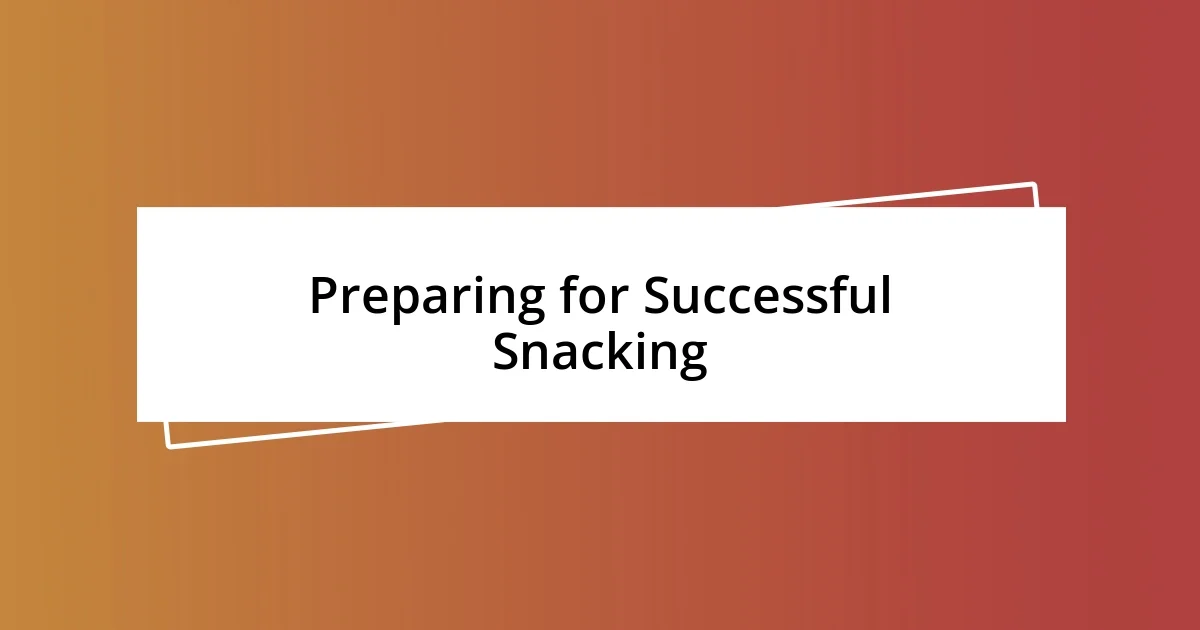
Preparing for Successful Snacking
When it comes to preparing for successful snacking, I find that setting the scene makes all the difference. For example, on days when I consciously designate a space for my snacks—a cozy corner in my kitchen or a favorite spot on the couch—I notice that I approach my food with more intention. Have you ever thought about how the environment impacts your eating experience? I realize now that a simple, inviting setup can elevate snacking from a mindless activity to a cherished moment of self-care.
I also believe that planning is essential for mindful snacking. Each week, I dedicate time to organize my snacks—creating colorful containers filled with fresh fruits, crunchy nuts, and vibrant veggies. When I open my fridge and see these beautifully arranged options, it feels like an invitation to nourish myself. Knowing that my go-to snacks are not just convenient but also visually appealing encourages me to reach for them rather than the less mindful choices. What do you think your snack prep could look like?
Ultimately, preparation isn’t just about the food; it involves establishing a routine. I’ve discovered that having a designated snacking time helps me to slow down and truly appreciate what I’m eating. For instance, each afternoon, I pause for a ten-minute break with a snack, making it a mini ritual in my day. This little gesture serves as a reminder to reconnect with my body and emotions, transforming my relationship with food into a more mindful practice. How would incorporating intentional snack times change your day?
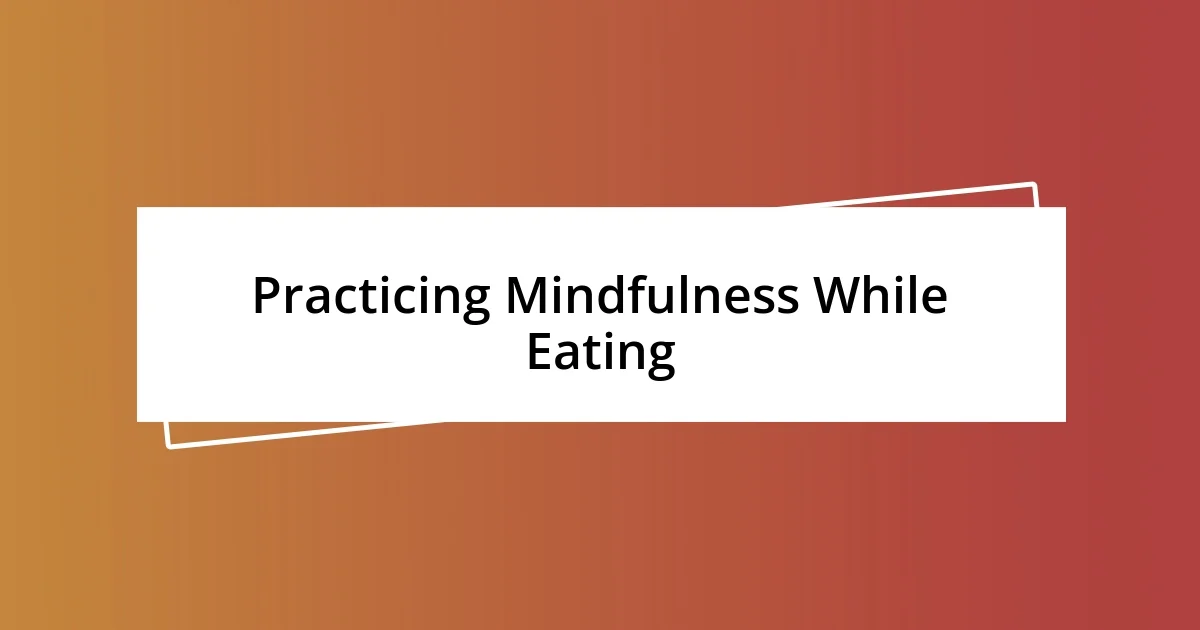
Practicing Mindfulness While Eating
Practicing mindfulness while eating is all about being present in the moment. I remember a day when I sat down with a bowl of mixed berries. Instead of rushing through, I took the time to savor each bite, noticing the sweetness and the slight tartness of each berry. I found myself thinking, “How often do I really enjoy my food?” This simple act transformed my snack from a mundane habit into a joyful experience.
Engaging your senses can significantly enhance mindful eating. I often close my eyes while enjoying a snack, letting the flavors wash over me. One afternoon, I did this with a piece of dark chocolate. Each square melted slowly in my mouth, and I could truly appreciate its rich texture and depth. It’s moments like these that remind me that food isn’t just fuel; it’s an experience meant to be relished. Have you ever tried to deepen your experience with your favorite snack?
Another practice I find beneficial is breathing before I eat. Taking a few deep breaths helps me reset and turn my attention inward. One evening, after a long day, I chose to slow down with a handful of nuts. I inhaled the nutty aroma before I popped one into my mouth, connecting with the entire process of eating. It became less about the act itself and more about the enjoyment that comes along with it. How could incorporating a few deep breaths change your snacking experience?
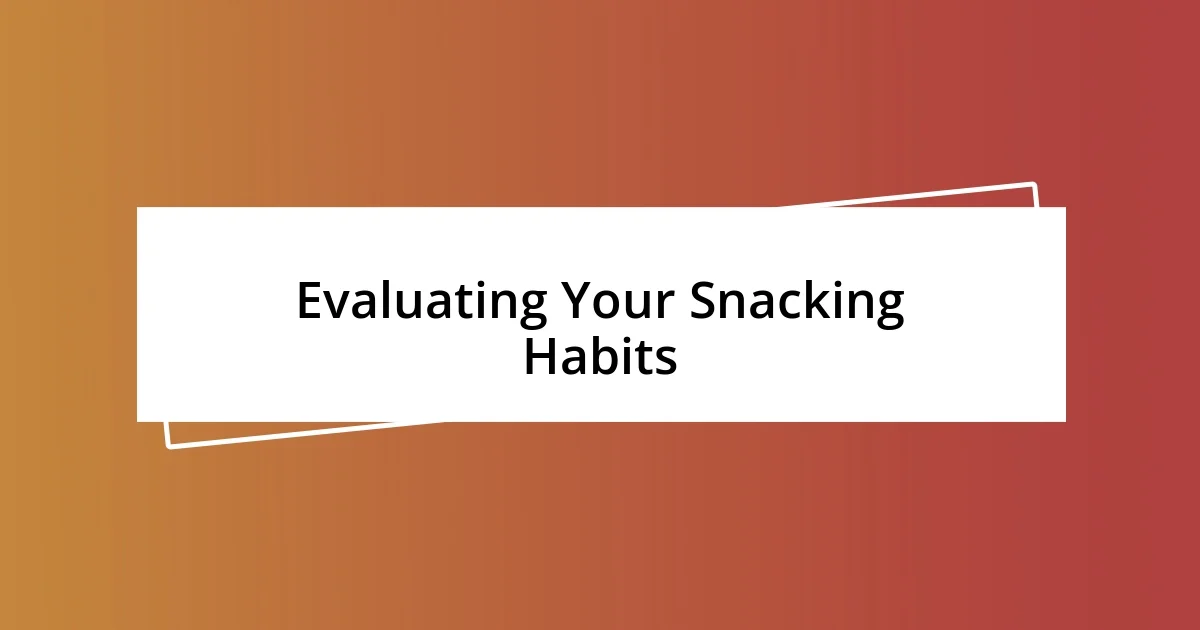
Evaluating Your Snacking Habits
Evaluating your snacking habits can be quite the eye-opener. I remember when I first took a close look at what I was reaching for during those late-night cravings. I was often drawn to salty chips or sugary sweets, and it hit me how mindlessly I indulged. How often do we stop to really think about whether our snacks align with our wellness goals?
One simple exercise I found helpful was keeping a snacking journal. I tracked what I ate, why I chose it, and how I felt afterwards. This practice unveiled patterns I hadn’t noticed before, like how I often snacked out of boredom or stress rather than hunger. Has paying attention to the triggers behind your snacking ever revealed surprising insights for you?
Now, I try to ask myself key questions before I snack. Am I truly hungry, or is it just a habitual response? Is this snack nourishing me physically and emotionally? This self-reflection allows me to choose snacks that resonate with my needs and feelings. I’ve found that when I approach snacking with intention, it transforms into a more fulfilling experience, leaving me genuinely satisfied. How could a little self-awareness reshape your own snacking habits?
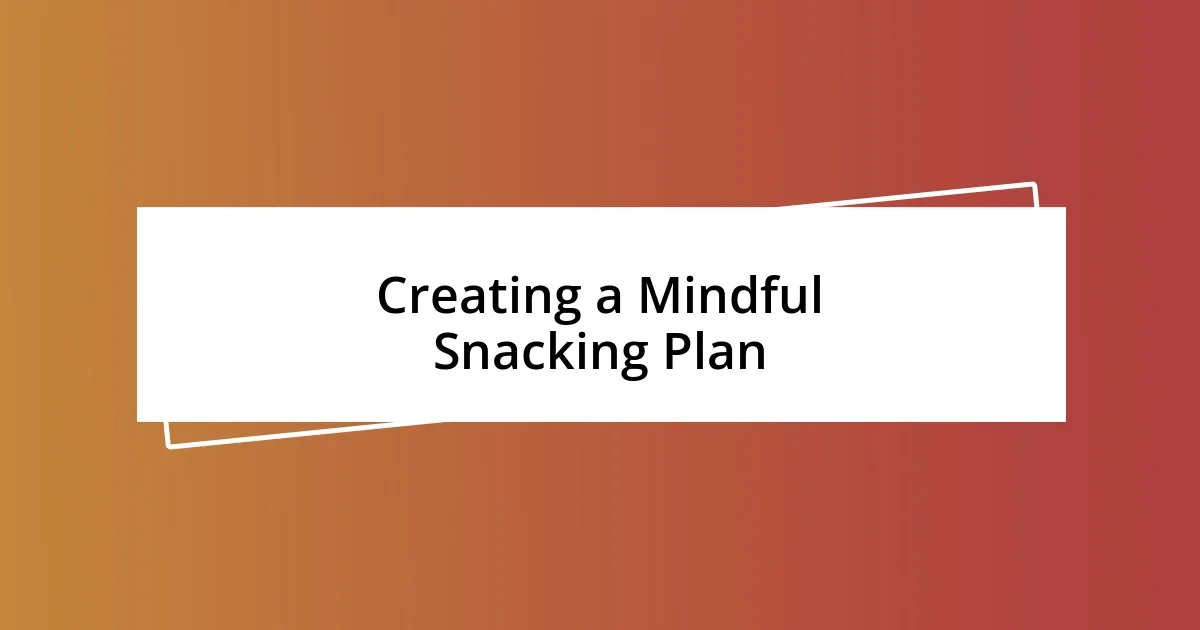
Creating a Mindful Snacking Plan
Creating a mindful snacking plan involves a bit of strategy and self-awareness. For me, the first step was identifying snacks that genuinely excite me while offering nutritional value. I started organizing my pantry, placing healthier options at eye level—like nuts and dried fruits—and tucking away the overly processed snacks. This subtle change made me more inclined to reach for a handful of almonds rather than a sugary granola bar. Have you ever considered rearranging your space to nudge you towards healthier choices?
Once I had my snacks sorted, I began scheduling specific times for mindful munching. I used to mindlessly snack in front of the TV, but now I dedicate a peaceful 10 minutes each afternoon to enjoy a snack. This routine not only enriches the experience but allows me to reconnect with my hunger cues. As I sit quietly, I often savor the colors and textures of my food. How might carving out dedicated time for snacking shift your relationship with food?
A crucial part of my plan also includes preparing snacks ahead of time. I find that when I make little containers of veggies with hummus or pre-pack fruit, I’m more likely to grab those on busy days. It’s almost like creating a snack ritual that inspires mindfulness. I remember the last time I prepped snacks for the week; it felt like a small act of self-care that set a positive tone for my days. What might preparing snacks in advance teach you about your eating habits?












